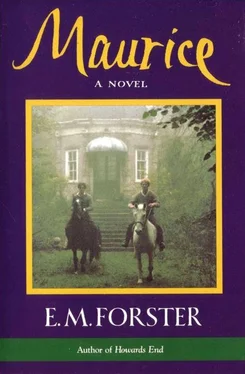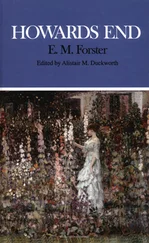"He's on a visit."
Auntie remarked that the first duty of a visitor was to conform to the rules of the house. Hitherto he had never opposed her, but now he said, "The rule of this house is that everyone does what they like."
"Breakfast is at half past eight."
"For those who like. Those who are sleepy like breakfast at nine or ten."
"No house could go on, Maurice. No servants would stop, as you will find."
"I'd rather servants went than my guests were treated like schoolboys."
"A schoolboy! Haw! He is one!"
"Mr Barry's now at Woolwich," said Maurice shortly.
Aunt Ida snorted, but Miss Tonks shot him a glance of respect. The others had not listened, intent on poor Mrs Durham, who would now only have the dower house. The loss of his temper left him very happy. In a few minutes Dickie joined them, and he rose to greet his god. The boy's hair was now flat from the bath, and his graceful body hidden beneath clothes, but he remained extraordinarily beautiful. There was a freshness about him — he might have arrived with the flowers — and he gave the impression of modesty and of good will. When he apologized to Mrs Hall, the note of his voice made Maurice shiver. And this was the child he wouldn't protect at Sunnington! This the guest whose arrival last night he had felt rather a bore.
So strong was the passion, while it lasted, that he believed the crisis of his life had come. He broke all engagements, as in the old days. After breakfast he saw Dickie to his uncle's, got arm in arm with him, and exacted a promise for tea. It was kept. Maurice abandoned himself to joy. His blood heated. He would not attend to the talk, yet even this advantaged him, for when he said "What?" Dickie came over to the sofa. He passed an arm round him… The entrance of Aunt Ida may have averted disaster, yet he thought he saw response in the candid eyes.
They met once more — at midnight. Maurice was not happy now, for during the hours of waiting his emotion had become physical.
"I'd a latch key," said Dickie, surprised at finding his host up.
"I know."
There was a pause. Both uneasy, they were glancing at each other and afraid to meet a glance.
"Is it a cold night out?"
"No."
"Can I get you anything before I go up?"
"No, thanks."
Maurice went to the switches and turned on the landing light. Then he turned out the lights in the hall and sprang after Dickie, overtaking him noiselessly.
"This is my room," he whispered. "I mean generally. They've turned me out for you." He added, "I sleep here alone." He was conscious that words were escaping him. Having removed Dickie's overcoat he stood holding it, saying nothing. The house was so quiet that they could hear the women breathing in the other rooms.
The boy said nothing either. The varieties of development are endless, and it so happened that he understood the situation perfectly. If Hall insisted, he would not kick up a row, but he had rather not: he felt like that about it.
"I'm above," panted Maurice, not daring. "In the attic over this — if you want anything — all night alone. I always am."
Dickie's impulse was to bolt the door after him, but he dismissed it as unsoldierly, and awoke to the ringing of the breakfast bell, with the sun on his face and his mind washed clean.
30
This episode burst Maurice's life to pieces. Interpreting it by the past, he mistook Dickie for a second Clive, but three years are not lived in a day, and the fires died down as quickly as they had risen, leaving some suspicious ashes behind them. Dickie left on the Monday, and by Friday his image had faded. A client then came into the office, a lively and handsome young Frenchman, who implored Monsieur 'All not to swindle him. While they chaffed, a familiar feeling arose, but this time he smelt attendant odours from the abyss. "No, people like me must keep our noses to the grindstone, I'm afraid," he replied, in answer to the Frenchman's prayer to lunch with him, and his voice was so British that it produced shouts of laughter and a pantomime.
When the fellow had gone he faced the truth. His feeling for Dickie required a very primitive name. He would have sentimentalized once and called it adoration, but the habit of honesty had grown strong. What a stoat he had been! Poor little Dickie! He saw the boy leaping from his embrace, to smash through the window and break his limbs, or yelling like a maniac until help came. He saw the police —
"Lust." He said the word out loud.
Lust is negligible when absent. In the calm of his office Maurice expected to subdue it, now that he had found its name. His mind, ever practical, wasted no time in theological despair, but advanced to the grindstone. He had been forewarned, and therefore forearmed, and had only to keep away from boys and young men to ensure success. Yes, from other young men. Certain obscurities of the last six months became clear. For example, a pupil at the Settlement — He wrinkled his nose, as one who needs no further proof. The feeling that can impel a gentleman towards a person of lower class stands self-condemned.
He did not know what lay ahead. He was entering into a state that would only end with impotence or death. Clive had postponed it. Clive had influenced him, as always. It had been understood between them that their love, though including the body, should not gratify it, and the understanding had proceeded — no words were used — from Clive. He had been nearest to words on the first evening at Penge, when he refused Maurice's kiss, or on the last afternoon there, when they lay amid deep fern. Then had been framed the rule that brought the golden age, and would have sufficed till death. But to Maurice, despite his content, there had been something hypnotic about it. It had expressed Clive, not him, but now that he was alone he cracked hideously, as once at school. And it was not Clive who would heal him. That influence, even if exerted, would have failed, for a relation such as theirs cannot break without transforming both men for ever.
But he could not realize all this. The ethereal past had blinded him, and the highest happiness he could dream was a return to it. As he sat in his office working, he could not see the vast curve of his life, still less the ghost of his father sitting opposite. Mr Hall senior had neither fought nor thought; there had never been any occasion; he had supported society and moved without a crisis from illicit to licit love. Now, looking across at his son, he is touched with envy, the only pain that survives in the world of shades. For he sees the flesh educating the spirit, as his has never been educated, and developing the sluggish heart and the slack mind against their will.
Presently Maurice was called to the telephone. He raised it to his ear, and, after six months' silence, heard the voice of his only friend.
"Hullo," he began, "hullo, you will have heard my news, Maurice."
"Yes, but you didn't write, so I didn't."
"Quite so."
"Where are you now?"
"Off to a restaurant. We want you to come round there. Will you?"
"I'm afraid I can't. I've just refused one invitation to lunch."
"Are you too busy to talk a little?"
"Oh no."
Clive resumed, evidently relieved by the atmosphere. "My young woman's with me. Presently she'll talk too."
"Oh, all right. Tell me all your plans."
"The wedding's next month."
"Best of luck."
Neither could think of anything to say.
"Now for Anne."
"I'm Anne Woods," said a girl's voice.
"My name's Hall."
"What?"
"Maurice Christopher Hall."
"Mine's Anne Clare Wilbraham Woods, but I can't think of anything to say."
"No more can I."
"You're the eighth friend of Clive I've talked to in this way this morning."
Читать дальше












